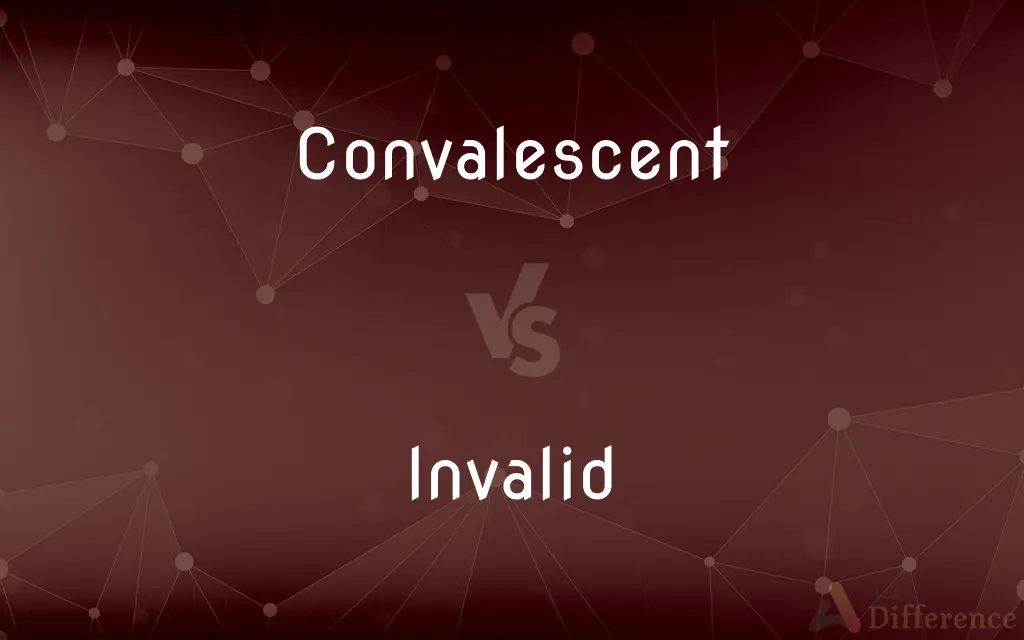Convalescent vs. Invalid — What's the Difference?
By Tayyaba Rehman & Maham Liaqat — Updated on March 11, 2024
A convalescent is recovering from illness, while an invalid is incapacitated by illness or injury.

Difference Between Convalescent and Invalid
Table of Contents
ADVERTISEMENT
Key Differences
Convalescence refers to the period or process of recovery after illness or medical treatment, where patients regain their strength and return to normal health. On the other hand, an invalid is someone rendered incapacitated by illness or injury, often implying long-term or permanent disability, affecting daily activities and quality of life.
While a convalescent person is on the path to regaining full health and resuming their regular activities, an invalid may require ongoing care, support, and adaptations to their living environment due to their health limitations. The distinction lies in the temporary nature of convalescence versus the potentially enduring state of being an invalid.
The term "convalescent" conveys a sense of optimism and progression towards health, focusing on the healing process and improvement. Conversely, "invalid" can imply a more static condition, with emphasis on the limitations and challenges faced by the individual due to their health status.
Medical and therapeutic interventions for convalescents are often geared towards rehabilitation and strengthening, aiming to expedite their return to normal life. Whereas for invalids, medical care might focus on managing symptoms, preventing complications, and enhancing life quality within the constraints of their condition.
Social perceptions and language usage reflect these differences; convalescence is generally viewed as a temporary state, whereas being an invalid can carry implications of long-term dependency or disability. This distinction underscores the importance of context and specificity in health-related discussions.
ADVERTISEMENT
Comparison Chart
Definition
Recovering from illness or medical treatment
Incapacitated by illness or injury
Duration
Temporary, transitional
Potentially long-term or permanent
Focus of Care
Rehabilitation, regaining strength
Managing symptoms, adapting to limitations
Perception
Optimistic, improving condition
May imply dependency, long-term disability
Activity Level
Increasing, as strength and health improve
Limited, may require assistance and adaptation
Compare with Definitions
Convalescent
A person recovering from an illness or operation.
The convalescent patient started walking again to rebuild strength.
Invalid
May involve continuous medical care.
Invalid patients frequently need ongoing medical monitoring and treatments.
Convalescent
Rehabilitation aimed at full recovery.
Convalescent care programs focus on physical therapy and nutrition.
Invalid
Often associated with permanent conditions.
She became an invalid after her illness, adapting her home for accessibility.
Convalescent
Temporary status with positive progression.
He was a convalescent for six weeks after the surgery.
Invalid
Focus on quality of life within limitations.
Despite being an invalid, he pursues interests and activities within his capacity.
Convalescent
Pertaining to the period of health recovery.
She is in a convalescent phase, gradually returning to her usual activities.
Invalid
Unable to care for oneself due to disability or illness.
The accident left him an invalid, requiring daily assistance.
Convalescent
Increasing activity as health improves.
Convalescents often resume hobbies as part of their recovery.
Invalid
Relating to long-term incapacity.
Invalid care facilities offer specialized support for those with chronic conditions.
Convalescent
The period needed for returning to health after illness.
Invalid
One who is incapacitated by a chronic illness or disability.
Convalescent
Gradual return to health and strength after illness.
Invalid
Incapacitated by illness or injury.
Convalescent
Recovering one's health and strength after a period of illness
Invalid
Of, relating to, or intended for invalids.
Convalescent
Of convalescence or convalescents
She stayed in a convalescent hospital for two weeks before returning home.
Invalid
Not legally or factually valid; null
An invalid license.
Convalescent
A person recovering from illness.
I had been ill in health, but am now a convalescent.
Invalid
Falsely based or reasoned; faulty
An invalid argument.
Convalescent
Recovering from sickness or debility; partially restored to health or strength.
Invalid
To incapacitate physically.
Convalescent
Of or pertaining to convalescence.
Invalid
Chiefly British To release or exempt from duty because of ill health
"I was not quite sick enough to be invalided out, even though I was of no more use" (Mary Lee Settle).
Convalescent
One recovering from sickness.
Invalid
Not valid; not true, correct, acceptable or appropriate.
Your argument is invalid because it uses circular reasoning.
This invalid contract cannot be legally enforced.
Convalescent
A person who is recovering from illness
Invalid
Suffering from disability or illness.
Convalescent
Of or for or relating to convalescence or convalescents;
Convalescent home
Invalid
Intended for use by an invalid.
Convalescent
Returning to health after illness or debility;
Convalescent children are difficult to keep in bed
Invalid
Any person with a disability or illness.
Invalid
A person who is confined to home or bed because of illness, disability or injury; one who is too sick or weak to care for themselves.
Invalid
(archaic) A disabled member of the armed forces; one unfit for active duty due to injury.
Invalid
To exempt from (often military) duty because of injury or ill health.
He was invalided home after the car crash.
Invalid
(transitive) To make invalid or affect with disease.
Invalid
Of no force, weight, or cogency; not valid; weak.
Invalid
Having no force, effect, or efficacy; void; null; as, an invalid contract or agreement.
Invalid
Not well; feeble; infirm; sickly; as, he had an invalid daughter.
Invalid
A person who is weak and infirm; one who is disabled for active service; especially, one in chronic ill health who is unable to care for himself.
Invalid
To make or render invalid or infirm.
Invalid
To classify or enroll as an invalid.
Peace coming, he was invalided on half pay.
Invalid
Someone who is incapacitated by a chronic illness or injury
Invalid
Force to retire, remove from active duty, as of firemen
Invalid
Injure permanently;
He was disabled in a car accident
Invalid
Having no cogency or legal force;
Invalid reasoning
An invalid driver's license
Invalid
No longer valid;
The license is invalid
Common Curiosities
Can a convalescent become an invalid?
While unusual, a convalescent could become an invalid if recovery is incomplete and results in long-term disability.
How long does convalescence last?
Convalescence duration varies widely, depending on the illness severity and individual health factors.
What support might an invalid need?
Invalids may require medical care, personal assistance, adaptive equipment, and modifications to their living environment.
What does it mean to be convalescent?
Being convalescent means being in the process of recovering from illness or medical treatment, regaining strength and health.
Are there therapies for convalescents?
Yes, convalescents often engage in physical therapy, occupational therapy, and other rehabilitative services to aid recovery.
What aids might an invalid use in daily life?
Mobility aids, assistive devices, and home modifications are common aids to support the independence of invalids.
How do societal perceptions of convalescents and invalids differ?
Convalescents are often seen as actively improving, while invalids may be perceived as facing more static and long-term challenges.
What is the main goal of care for convalescents?
The main goal is to support full recovery, enhancing strength and health to return to normal activities.
Do convalescents require special diets?
Sometimes, tailored nutrition can be part of convalescence to support healing and strength recovery.
Can convalescence include mental health support?
Yes, mental health is a crucial aspect of convalescence, especially after severe illnesses or surgeries.
Can the state of being an invalid change over time?
Yes, improvements in medical treatment and rehabilitation can alter an individual's status, potentially reducing the impact of their disability.
How is the care for an invalid organized?
Care for an invalid is typically comprehensive, addressing medical, physical, and emotional needs, often involving a multidisciplinary team.
What factors influence the length of convalescence?
The illness's nature, the patient's overall health, age, and the quality of care can all influence convalescence duration.
Is being an invalid always permanent?
Not always; the condition can improve with medical advancements and rehabilitation, though some cases may be permanent.
What role does family play for convalescents and invalids?
Family can provide crucial support, both emotional and physical, aiding in recovery for convalescents and improving quality of life for invalids.
Share Your Discovery

Previous Comparison
Exalt vs. Exult
Next Comparison
Hoof vs. PawAuthor Spotlight
Written by
Tayyaba RehmanTayyaba Rehman is a distinguished writer, currently serving as a primary contributor to askdifference.com. As a researcher in semantics and etymology, Tayyaba's passion for the complexity of languages and their distinctions has found a perfect home on the platform. Tayyaba delves into the intricacies of language, distinguishing between commonly confused words and phrases, thereby providing clarity for readers worldwide.
Co-written by
Maham Liaqat













































